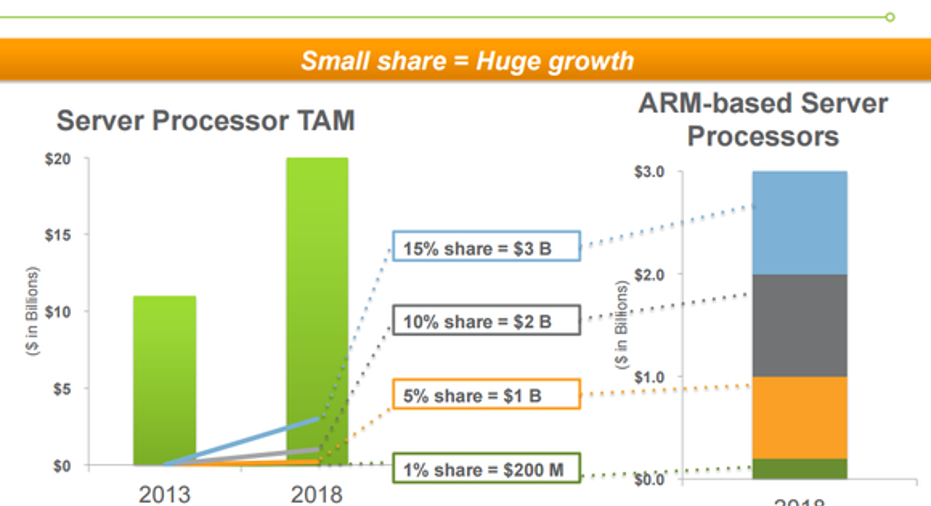Applied Micro's X-Gene Was an Abject Failure

On Nov. 21, MACOM (NASDAQ: MTSI) announced that it would be scooping up data-center connectivity specialist Applied Micro (NASDAQ: AMCC) for $770 million in a combined cash-and-stock deal.
MACOM was quite clear that it wanted Applied Micro primarily for its data-center connectivity-chip business and planned to dispose of Applied's much-touted X-Gene ARM server processor technology and development efforts quickly after the deal closes.
After reviewing the slide deck going over this acquisition that's posted on MACOM's website, it's abundantly clear that X-Gene was an abject failure.
Image source: Intel.
Lots of operating expenses; practically no revenue
According to the slides, 72% of Applied Micro's revenue and 49% of its operating expenses came from its core connectivity business. MACOM says this business generates roughly $40 million in annual profitability.That figure, as well as the profitability figures that MACOM gives for Applied's other businesses, comes from MACOM's annualizing of Applied's most recent quarterly results.
Applied Micro's embedded processing business accounted for 27% of Applied's revenue, and 0% of its operating expenses. MACOM says this segment is good for about $22 million in annual profits.
Finally, MACOM says that just 1% of Applied Micro's revenue and a whopping 51% of its operating expenses were related to its X-Gene ARM server efforts, leading to a yearly loss of around $55 million.To put that into perspective, analysts expect that Applied Micro will generate about $170 million in revenue in its current fiscal year, and 1% of that figure is just $1.7 million.
Applied's X-Gene is a bust, and management may have known it
That MACOM is in a hurry to dump X-Gene doesn't necessarily tell us about MACOM's view of X-Gene's long-term prospects in the marketplace; even a successful ARM server processor business would be, to borrow MACOM's words, "non-strategic" relative to MACOM's current product portfolio.
As I wrote previously, the big tell that X-Gene's prospects were poor was that Applied Micro agreed to a sale process now.
The X-Gene business generated roughly $1.7 million and was driving an operating loss of $55 million. That's bad, but it's also worth pointing out that if Applied could have taken even a relatively small, but meaningful, part of the server processor market, this business could have generated significant profit.
Indeed, Applied Micro expected that the server processor total addressable market in 2018 would be around $20 billion. The company pitched to investors that because of its size, capturing relatively small market share would mean "huge growth" for Applied Micro.
Just 1% of that figure, for example, would mean $200 million in incremental revenue. At 60% gross profit margin, that would be an additional $120 million in gross profit -- more than enough to bring this business segment solidly into the black.
Image source: Applied Micro.
If Applied Micro's management and board of directors had confidence that the company was on track to capture even 1% of the server processor market within a reasonable time frame, then selling out to MACOM at the price it ultimately did would have been downright silly.
10 stocks we like better than Applied Micro Circuits When investing geniuses David and Tom Gardner have a stock tip, it can pay to listen. After all, the newsletter they have run for over a decade, Motley Fool Stock Advisor, has tripled the market.*
David and Tom just revealed what they believe are the 10 best stocks for investors to buy right now... and Applied Micro Circuits wasn't one of them! That's right -- they think these 10 stocks are even better buys.
Click here to learn about these picks!
*Stock Advisor returns as of November 7, 2016
Ashraf Eassa owns shares of Intel. The Motley Fool recommends Intel. Try any of our Foolish newsletter services free for 30 days. We Fools may not all hold the same opinions, but we all believe that considering a diverse range of insights makes us better investors. The Motley Fool has a disclosure policy.



















